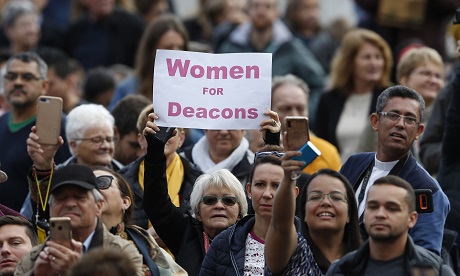An early church deacon’s example saw 56 pilgrims from four countries gather in Mexico City on Saturday.
They were there to celebrate St Phoebe’s feast day.
St Phoebe is mentioned in the New Testament’s Letter to the Romans just once. She was an associate of St Paul and a female deacon of the early church.
Today Catholic deacons are ordained clergy. They preach and minister in the community but can’t celebrate Mass.
Like priests and bishops, they are always men.
The pilgrims – called Discerning Deacons – prayed for Phoebe’s intercession to restore Catholic women to the diaconate.
“Phoebe represents hope and evidence that women have been in service to the church since the beginning,” says Discerning Deacons’ member Lisa Annan.
“This isn’t new. It makes me feel that it can happen in the future.”
The prayer service opened the Discerning Deacons’ “Year of St Phoebe,” and is part of the Synod on Synodality.
Discerning Deacons hope the synod, which concludes in 2023, might lead to reforms that will welcome women as deacons.
Canon law defines deacons as clergy who minister to the people of God in “word, liturgy and charity”.
While women fulfil some roles already, they cannot minister to people in places such as immigrant detention centres, hospitals and prisons that don’t allow unordained people to serve.
Joining the diaconate would also allow women to proclaim the Gospel and preach during Mass.
Until the 12th century, the Catholic Church ordained women deacons. In his Letter to the Romans, Paul introduces Phoebe as a “deacon of the church” and entrusts her to deliver his letter to the Romans.
She is the only woman in the New Testament with that title.
While the Catholic Church has not ordained women in 800 years, it has made exceptions where male priests are in short supply.
In the Amazon region of northwestern Brazil, a woman has been the mainstay of the church’s social outreach.
In 2019 many Pan-Amazonian bishops asked the Vatican for a permanent diaconate for women.
One of them, Archbishop Roque Paloschi of Brazil, was among the seven-member Brazilian delegation to Mexico City for the St Phoebe prayer service.
The five-day pilgrimage sponsored by Discerning Deacons includes Mass at the Shrine of Our Lady of Guadalupe and visits to the birthplace of Juan Diego and the Mayan pyramids at Teotihuacan.
The pilgrimage will also seek ways to continue to engage with bishops, priests and laity as the synod process unfolds.
“The first step is listening well. It’s a new discipline for us — the art of listening well to another and setting aside agendas says one pilgrim.
So far the group has held listening sessions as part of the synodal process, drawing some 9,000 Catholics. Its 38-page report reflects people’s desire for a female diaconate that works with people on the margins.
They’re realistic that restoring the diaconate will be an uphill climb.
But they are glad to be able to elevate St Phoebe’s example. Even today, she’s still relevant.
“I see her in every mother and grandmother who has helped to pass on the faith,” explains one.
Additional readingNews category: World.




